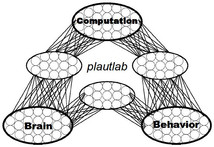Resources
Lens simulator
Lens (Light Efficient Network
Simulator) is a neural network simulation software package developed by
Doug Rohde when he was a graduate student
in Computer Science at CMU. An extended version is used for much of the
simulation work in the Plaut lab. Source code and binary executables for
Windows, OSX, and Linux can be downloaded
here.
Xerion simulator
Xerion is a simulator written originaly by Tony Plate at
the University of Toronto. It was in many ways a precurser to Lens and was
used to run the simulations reported in Plaut, McClelland, Seidenberg and
Patterson (1996,
Psychological Review). Performance measures for the
networks reported in Plaut et al. (1996) can be found
here.
SOS
SOS (Stochastic Optimization of
Stimuli) is a software package developed by former graduate students Blair
Armstrong and Christine Watson. The package rapidly and reliably finds
stimuli that optimally satisfy the constraints imposed by an experimenter.
This allows the experimenter to focus on selecting an optimization problem
that suits their theoretical question and not on the tedious task of manually
selecting stimuli. The software implementation of SOS and a user manual are
provided free of charge for academic purposes as compiled binaries and as
MATLAB source files.
eDom
eDom is a software package that was
developed to facilitate the collection of dominance ratings (i.e., the
proportion of times each meaning of a word is encountered) for ambiguous words
like <river/money> BANK. In its current form, eDom presents participants with
the dictionary definitions of homonyms and collects subjective estimates of
how often each meaning is encountered. It also allows participants to enter
additional definitions. The full source code is available under the GPL
licensing scheme and could be readily extended for a variety of other norming
tasks. Currently, eDom norms are available for download from the main site
for American English and for two Spanish dialects.
- Armstrong, B.C., Tokewicz, N., and Plaut, D.C. (2012).
eDom: Norming software and relative meaning frequencies for 544 English homonyms.
Behavior Research Methods, 44, 1015-1027.
- Armstrong, B.C., Zugarramurdi, C., Cabana, A., Lisboa, J.V., and Plaut,
D.C. (2015).
Relative meaning frequencies for 578 homonyms in two Spanish dialects: A
cross-linguistic extension of the English eDom norms.
Behavior Research Methods.
